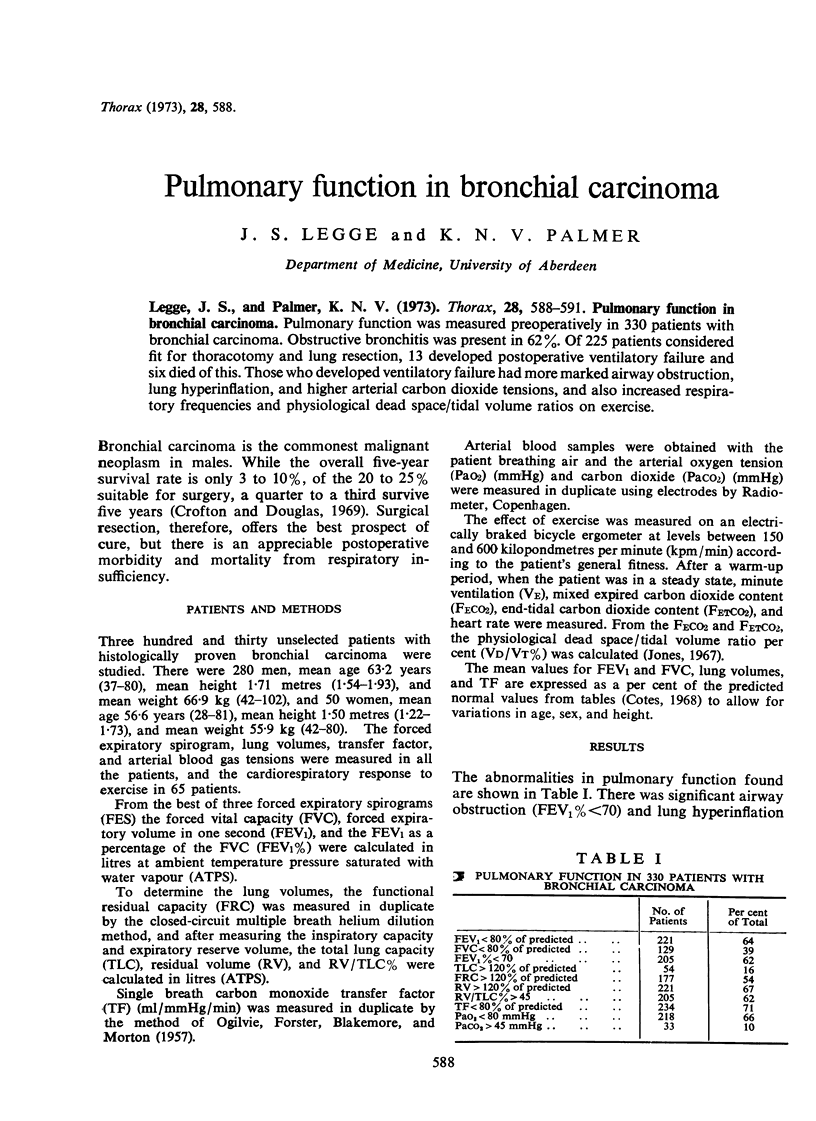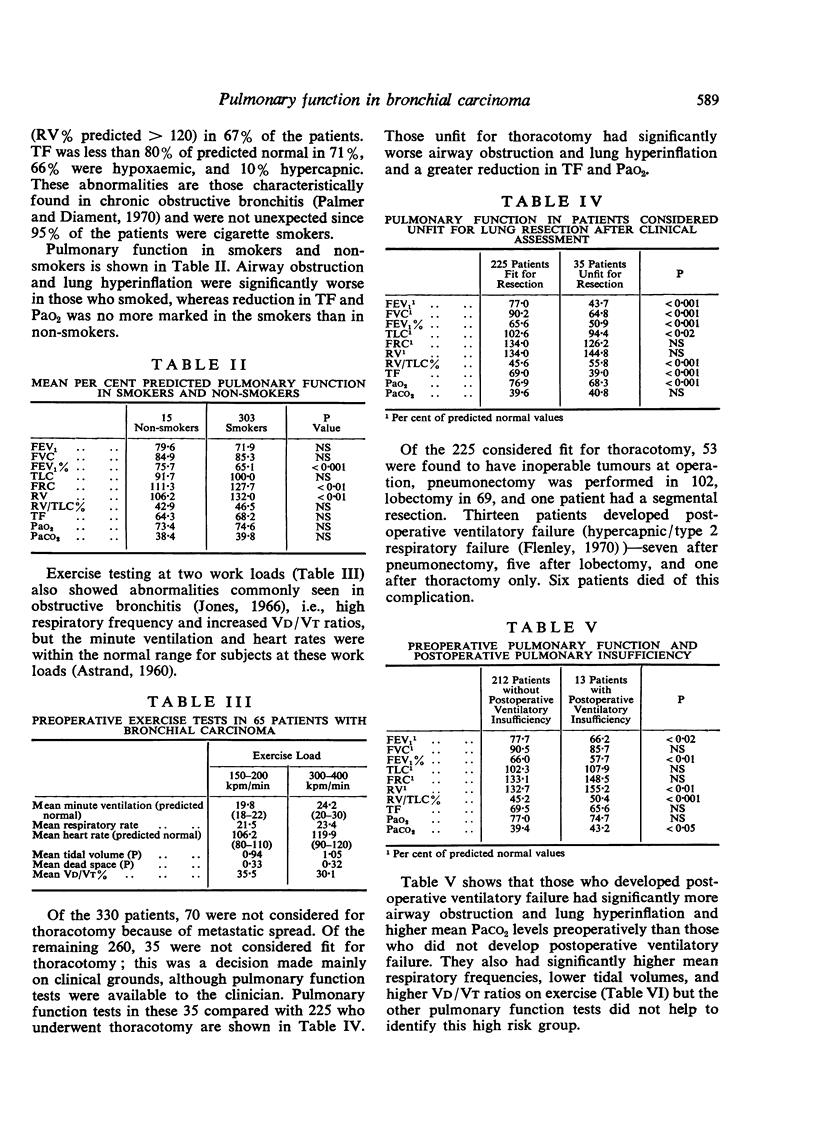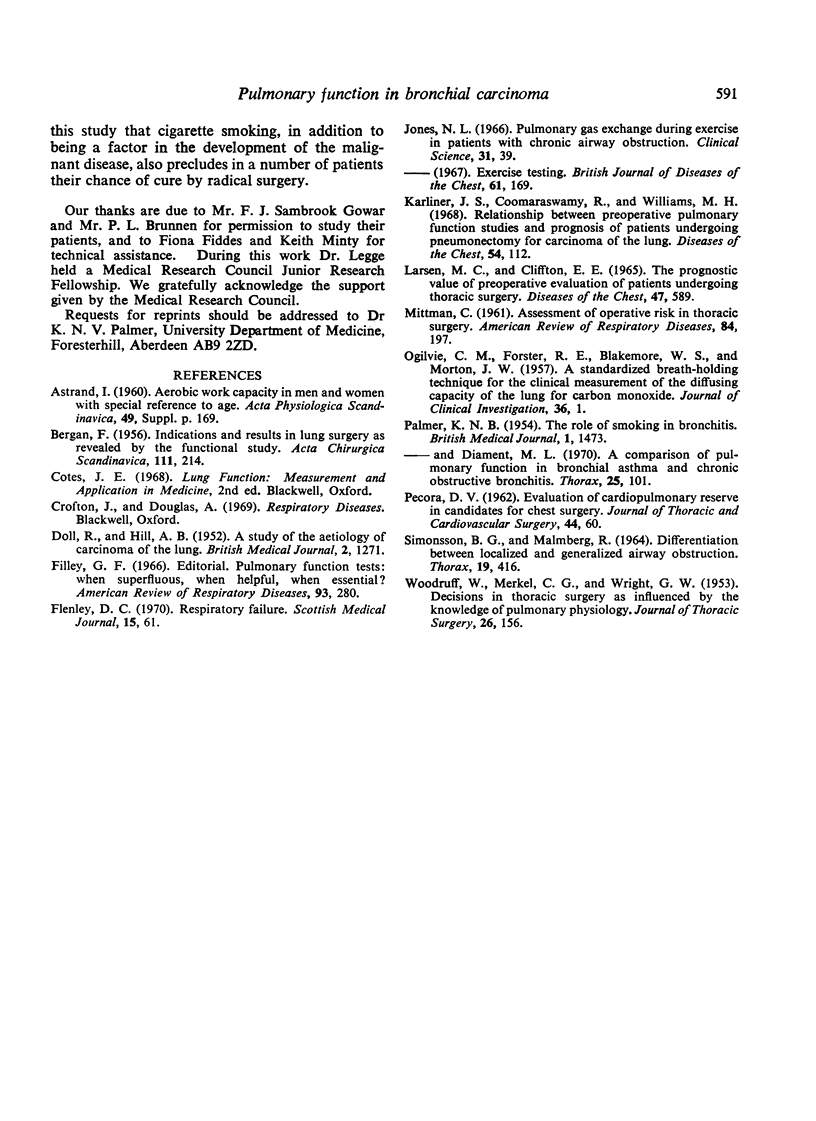Abstract
Legge, J. S., and Palmer, K. N. V. (1973).Thorax, 28, 588-591. Pulmonary function in bronchial carcinoma. Pulmonary function was measured preoperatively in 330 patients with bronchial carcinoma. Obstructive bronchitis was present in 62%. Of 225 patients considered fit for thoracotomy and lung resection, 13 developed postoperative ventilatory failure and six died of this. Those who developed ventilatory failure had more marked airway obstruction, lung hyperinflation, and higher arterial carbon dioxide tensions, and also increased respiratory frequencies and physiological dead space/tidal volume ratios on exercise.
Full text
PDF



Selected References
These references are in PubMed. This may not be the complete list of references from this article.
- BERGAN F. Indications and results in lung surgery as revealed by the functional study. Acta Chir Scand. 1956 Sep 25;111(3):214–225. [PubMed] [Google Scholar]
- BLAKEMORE W. S., FORSTER R. E., MORTON J. W., OGILVIE C. M. A standardized breath holding technique for the clinical measurement of the diffusing capacity of the lung for carbon monoxide. J Clin Invest. 1957 Jan;36(1 Pt 1):1–17. doi: 10.1172/JCI103402. [DOI] [PMC free article] [PubMed] [Google Scholar]
- DOLL R., HILL A. B. A study of the aetiology of carcinoma of the lung. Br Med J. 1952 Dec 13;2(4797):1271–1286. doi: 10.1136/bmj.2.4797.1271. [DOI] [PMC free article] [PubMed] [Google Scholar]
- Filley G. F. Pulmonary function tests: when superfluous, when helpful, when essential? Am Rev Respir Dis. 1966 Feb;93(2):280–283. doi: 10.1164/arrd.1966.93.2.280. [DOI] [PubMed] [Google Scholar]
- Flenley D. C. Respiratory failure. Scott Med J. 1970 Feb;15(2):61–72. doi: 10.1177/003693307001500205. [DOI] [PubMed] [Google Scholar]
- Jones N. L. Pulmonary gas exchange during exercise in patients with chronic airway obstruction. Clin Sci. 1966 Aug;31(1):39–50. [PubMed] [Google Scholar]
- Karliner J. S., Coomaraswamy R., Williams M. H., Jr Relationship between preoperative pulmonary function studies and prognosis of patients undergoing pneumonectomy for carcinoma of the lung. Dis Chest. 1968 Aug;54(2):112–118. doi: 10.1378/chest.54.2.112. [DOI] [PubMed] [Google Scholar]
- LARSEN M. C., CLIFFTON E. E. THE PROGNOSTIC VALUE OF PREOPERATIVE EVALUATION OF PATIENTS UNDERGOING THORACIC SURGERY. Dis Chest. 1965 Jun;47:589–594. doi: 10.1378/chest.47.6.589. [DOI] [PubMed] [Google Scholar]
- MITTMAN C. Assessment of operative risk in thoracic surgery. Am Rev Respir Dis. 1961 Aug;84:197–207. doi: 10.1164/arrd.1961.84.2.197. [DOI] [PubMed] [Google Scholar]
- PALMER K. N. The role of smoking in bronchitis. Br Med J. 1954 Jun 26;1(4877):1473–1474. doi: 10.1136/bmj.1.4877.1473-a. [DOI] [PMC free article] [PubMed] [Google Scholar]
- PECORA D. V. Evaluation of cardiopulmonary reserve in candidates for chest surgery. J Thorac Cardiovasc Surg. 1962 Jul;44:60–66. [PubMed] [Google Scholar]
- Palmer K. N., Diament M. L. A comparison of pulmonary function in bronchial asthma and chronic obstructive bronchitis. Thorax. 1970 Jan;25(1):101–104. doi: 10.1136/thx.25.1.101. [DOI] [PMC free article] [PubMed] [Google Scholar]
- SIMONSSON B. G., MALMBERG R. DIFFERENTIATION BETWEEN LOCALIZED AND GENERALIZED AIRWAY OBSTRUCTION. Thorax. 1964 Sep;19:416–419. doi: 10.1136/thx.19.5.416. [DOI] [PMC free article] [PubMed] [Google Scholar]
- WOODRUFF W., MERKEL C. G., WRIGHT G. W. Decisions in thoracic surgery as influenced by the knowledge of pulmonary physiology. J Thorac Surg. 1953 Aug;26(2):156–183. [PubMed] [Google Scholar]


